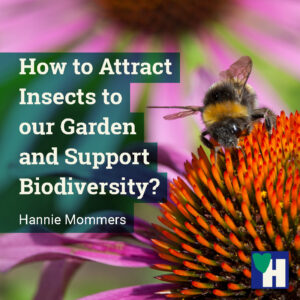
Do you like spiders? Flies? Mosquitoes? Most people don’t. Sometimes for good reasons, sometimes because of ancient-old ingrained fears.
Would we want to attract insects to our garden?
It turns out that people hate invertebrates. Bad news for those poor creatures, because they make up 98% of the animal species. And all humans do is try to destroy them.
In the movies, invertebrates come off badly, and in the Bible, too, they are portrayed solely as pests and exterminators. Small children usually have an intuitive fear of anything that has more than 2 legs – spiders, crabs – or less, such as snakes.
But without these animal species, we are also doomed. So we’d better take good care of them.
Some of the links are affiliate links. As an affiliate associate, we earn a commission when you purchase any of the products offered through the shared links at no extra cost for you. This helps us maintain this website.
Table of contents
How to attract insects to our garden
Insects are the cleaners of our world. They digest waste, process poop, and decompose corpses. And they pollinate the flowers so that plants can bear fruit. In short, they clean up after us and make sure we have food.
Why are insects important?
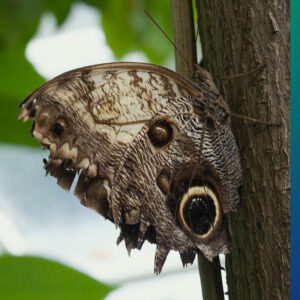
Over the course of history, there have been many moments when humans have impacted a regions’ fauna in the wrong way.
The most famous example is the importation of rabbits into Australia in the mid-18th century. Because the natural enemies of rabbits, such as the fox, are missing in Australia, the rabbit is a pest there.
It is less well known that imported cattle have also caused a nuisance. Australian dung beetles were used to wombats and kangaroos, not cattle. The layer of cow dung on the fields grew thicker and thicker and eventually dung beetles from other continents had to be introduced to solve the problem.
Not only pollination but also cleaning up is an important function of insects.
Related: Is Biodiversity Important to the Survival of Humans and the Planet?
Why would we want insects in our garden?
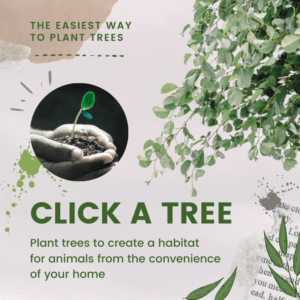
For the vegetable and flower garden, pollination is the most important job we want from insects. There are too few bees and they could use some help from us.
We prefer not to have lice on the plants and for this, we need their natural enemy, the ladybug.
In addition, we need insects in the compost heap. Worms digest the plant remains and make excellent compost.
Worms also aerate the soil in the vegetable garden.
Reasons enough to welcome insects, but how do you make the garden attractive to them?
Related: Attract Wildlife to our Garden to Promote Biodiversity in a Diverting Way
Insect hotel
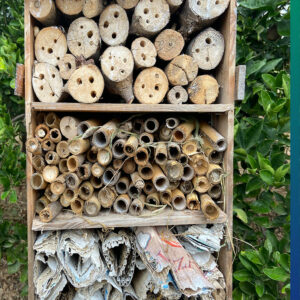
Insect hotels are great to attract various kinds to your garden. You can either buy them or make them yourself. Just make sure the insects can’t harm themselves on sharp edges.
Different types of insects require different types of shelter.
Bees nest in wood with drilled holes or in hollow bamboo. Choose bamboo sticks with a diameter that is not too large and close the back. Drill holes in a log, not planks.
Ladybugs and butterflies prefer a slightly larger space, although they each prefer a different type of access.
Pine cones or wood chips attract other insects, such as earwigs. Although that works better in a natural environment than in a bought insect hotel.
Blossoming plants
Between early spring and late autumn, insects search for warmth and food. The nectar or pollen they need is found in flowers that are in a sunny spot.
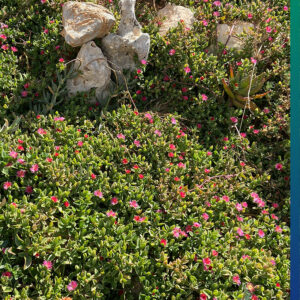
Flowers from ornamental plants as well as from herbs and vegetables are attractive to insects. Make sure that the plants have not been cultivated too much. Singular leaved flowers that smell nice are the best.
Nectar plants
Nectar plants are blossoming plants, but not every blossoming plant is a nectar plant. Nectar plants are extra attractive to butterflies and bees.
Visit a garden center on a sunny day to discover the plants that attract bees, butterflies, and bumblebees. Those are nectar plants for sure! Choose different kinds to attract several species of insects.
If possible in the area where you live, look for flowering plants that alternate throughout the season. This way you help the insects all year round.
Climbing plants
Climbing plants such as ivy and honeysuckle make great hiding places for insects. Birds also like to come there, for obvious reasons.
On a side note: ivy also seems to work well as a natural detergent. A few leaves in a laundry bag and the laundry comes out perfectly clean.
Compost heap
A compost heap is full of all kinds of beneficial insects. Even in our dry Spain, it is possible to make a compost heap, provided we keep it moist regularly.
Read our tips here: How to Start Organic Composting at Home Immediately
Lawn
Don’t mow the lawn all over, grow some of it so that wildflowers can thrive. Insects love it. As with the pruning waste, leave the grass clippings in a pile somewhere as a natural shelter.
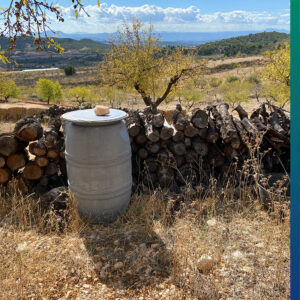
Dead hedge
A dead hedge is a natural insect hotel. If you don’t have room for a dead hedge, it is also sufficient to leave the pruning waste in a heap.
Pond
A pond attracts dragonflies and other insects. Unfortunately, it is also a hotbed for mosquitoes, which most of us are less fond of. You can solve that by keeping frogs in the pond.
Insects in our garden
Most insects are very useful to us. But if you have a vegetable garden, as we do, you’re not always happy with every insect.
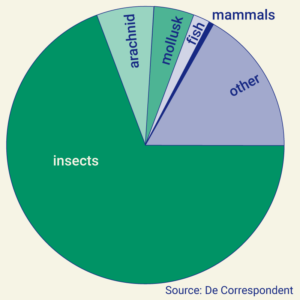
Grasshoppers, lice, and some beetles eat our crops before we can enjoy them ourselves. This can largely be solved by putting the right plants together.
Related: Organic Companion Planting for a Healthy Kitchen Garden
We can also import the natural enemies of these insects into our garden. Ladybugs are great lice catchers. Ladybug larvae are for sale, at least online and perhaps in stores near you.
Now that I am more and more immersed in biodiversity and the function of all living things, I have even begun to appreciate insects. 🙂 Although I have to say that mosquitoes never catch me. They do sting Tom. So I get that he doesn’t like mosquitoes!
What do you do to attract insects to your garden? Tell us in the comment box below.

